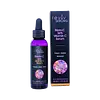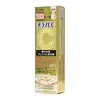What's inside
What's inside
 Key Ingredients
Key Ingredients

 Benefits
Benefits

 Concerns
Concerns

 Ingredients Side-by-side
Ingredients Side-by-side

3-O-Ethyl Ascorbic Acid
Skin ConditioningDimethyl Isosorbide
SolventCyclopentasiloxane
EmollientTetrahexyldecyl Ascorbate
AntioxidantButylene Glycol
HumectantPropylene Glycol
HumectantEthoxydiglycol
HumectantIsodecyl Neopentanoate
EmollientPhloretin
AntioxidantCaprylyl Glycol
EmollientTocopheryl Acetate
AntioxidantFerulic Acid
AntimicrobialGlutathione
Terminalia Ferdinandiana Fruit Extract
AntioxidantPhenoxyethanol
PreservativeEthylhexylglycerin
Skin ConditioningAlcohol
AntimicrobialGlycerin
HumectantPunica Granatum Seed Oil
EmollientAstaxanthin
Skin ConditioningTocotrienols
Skin ConditioningThioctic Acid
AntioxidantTocopherol
AntioxidantLycopene
AntioxidantXanthophylls
Skin ConditioningBeta-Carotene
Skin ConditioningSuperoxide Dismutase
Antioxidant3-O-Ethyl Ascorbic Acid, Dimethyl Isosorbide, Cyclopentasiloxane, Tetrahexyldecyl Ascorbate, Butylene Glycol, Propylene Glycol, Ethoxydiglycol, Isodecyl Neopentanoate, Phloretin, Caprylyl Glycol, Tocopheryl Acetate, Ferulic Acid, Glutathione, Terminalia Ferdinandiana Fruit Extract, Phenoxyethanol, Ethylhexylglycerin, Alcohol, Glycerin, Punica Granatum Seed Oil, Astaxanthin, Tocotrienols, Thioctic Acid, Tocopherol, Lycopene, Xanthophylls, Beta-Carotene, Superoxide Dismutase
Ascorbic Acid
AntioxidantPyridoxine Hcl
Skin ConditioningAllantoin
Skin ConditioningO-Cymen-5-Ol
Antimicrobial3-O-Ethyl Ascorbic Acid
Skin ConditioningAscorbyl Glucoside
AntioxidantAscorbyl Tetraisopalmitate
AntioxidantTocopherol
AntioxidantAlpinia Katsumadai Seed Extract
Skin ConditioningCitrus Limon Leaf Extract
PerfumingCitrus Grandis Leaf Extract
AstringentSerine
MaskingButylene Glycol
HumectantPropanediol
SolventIsopentyldiol
HumectantPropylene Glycol
HumectantPEG-8
HumectantAlcohol
AntimicrobialPolyglyceryl-3 Decyltetradecyl Ether
EmulsifyingSodium Metabisulfite
AntioxidantEDTA
Parfum
MaskingAscorbic Acid, Pyridoxine Hcl, Allantoin, O-Cymen-5-Ol, 3-O-Ethyl Ascorbic Acid, Ascorbyl Glucoside, Ascorbyl Tetraisopalmitate, Tocopherol, Alpinia Katsumadai Seed Extract, Citrus Limon Leaf Extract, Citrus Grandis Leaf Extract, Serine, Butylene Glycol, Propanediol, Isopentyldiol, Propylene Glycol, PEG-8, Alcohol, Polyglyceryl-3 Decyltetradecyl Ether, Sodium Metabisulfite, EDTA, Parfum
 Reviews
Reviews

Ingredients Explained
These ingredients are found in both products.
Ingredients higher up in an ingredient list are typically present in a larger amount.
You might know this ingredient as Ethyl Ascorbic Acid, a more stable version of ascorbic acid.
Like other types of vitamin C, this ingredient has many benefits including reducing wrinkles, skin soothing, dark spot fading, and fighting against free radicals.
3-O-Ethyl Ascorbic Acid interferes with the process of skin darkening, helping to reduce hyperpigmentation. It also encourages the skin to produce more collagen.
Once applied, 3-O-Ethyl Ascorbic Acid is converted to Vitamin C deeper in the skin's layers. This process is slow but makes this ingredient more tolerable for skin.
The optimum pH range for this ingredient is 4 - 5.5
Learn more about 3-O-Ethyl Ascorbic AcidAlcohol comes in many different forms. Different types of alcohol will have different effects on skin. This ingredient is usually an astringent alcohol.
These alcohols are drying on the skin. They may strip away your skin's natural oils and even damage your skin barrier. Astringent alcohols may also irritate skin.
Other types of astringent alcohols include:
According to the National Rosacea Society based in the US, you should be mindful of products with these alcohols in the top half of ingredients.
Any type of sanitizing product will have high amounts of alcohol to help kill bacteria and viruses.
Fatty alcohols come from plant oils such as coconut oil. These can help hydrate the skin and are non-irritating. Some fatty alcohols include cetyl and stearyl alcohol.
Learn more about AlcoholButylene Glycol (or BG) is used within cosmetic products for a few different reasons:
Overall, Butylene Glycol is a safe and well-rounded ingredient that works well with other ingredients.
Though this ingredient works well with most skin types, some people with sensitive skin may experience a reaction such as allergic rashes, closed comedones, or itchiness.
Learn more about Butylene GlycolPropylene Glycol is an odorless, colorless liquid. As a humectant, it helps skin retain moisture. It also aids in delivering active ingredients.
Another role of this ingredient is preventing a product from melting or freezing. Propylene glycol also adds antimicrobrial properties to a product, elongating product lifespan.
This ingredient is considered an organic alcohol and commonly added into both cosmetics and foods.
Those with sensitive skin or conditions may develop a rash when using this ingredient.
Learn more about Propylene GlycolTocopherol (also known as Vitamin E) is a common antioxidant used to help protect the skin from free-radicals and strengthen the skin barrier. It's also fat soluble - this means our skin is great at absorbing it.
Vitamin E also helps keep your natural skin lipids healthy. Your lipid skin barrier naturally consists of lipids, ceramides, and fatty acids. Vitamin E offers extra protection for your skin’s lipid barrier, keeping your skin healthy and nourished.
Another benefit is a bit of UV protection. Vitamin E helps reduce the damage caused by UVB rays. (It should not replace your sunscreen). Combining it with Vitamin C can decrease sunburned cells and hyperpigmentation after UV exposure.
You might have noticed Vitamin E + C often paired together. This is because it is great at stabilizing Vitamin C. Using the two together helps increase the effectiveness of both ingredients.
There are often claims that Vitamin E can reduce/prevent scarring, but these claims haven't been confirmed by scientific research.
Learn more about Tocopherol